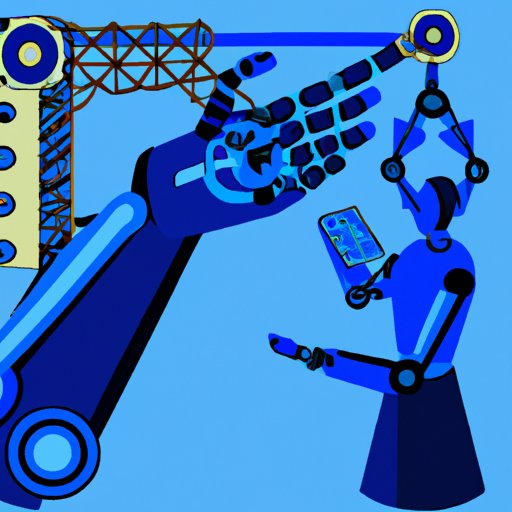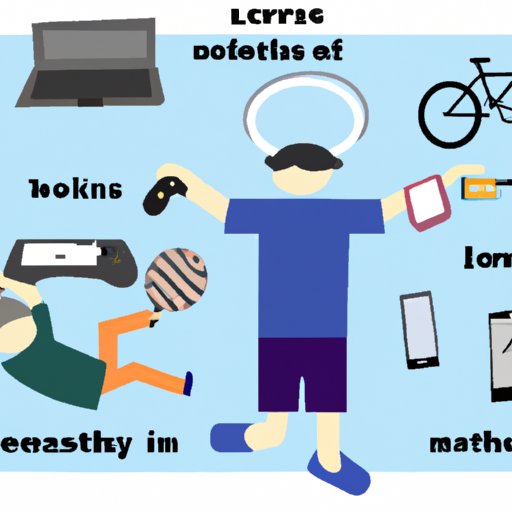Introduction
Technology is defined as “the application of scientific knowledge for practical purposes, especially in industry” (Oxford Dictionary). On the other hand, laziness is defined as “an unwillingness to work or use energy” (Cambridge Dictionary). With the advancement of technology, it has made humans increasingly reliant on machines, and this has led to an increase in laziness. This article will explore how technology has made us lazy by examining its impact on human laziness, such as increased dependency on machines, reduced physical activity and decreased motivation.

Examining the Impact of Technology on Human Laziness
The rise of technology has had a major impact on human laziness. From automated machines to voice recognition technology, many aspects of our lives have become easier and more convenient. However, this convenience comes with a cost – it has made us increasingly dependent on machines, leading to a decrease in physical activity and motivation.
Increased Dependency on Machines
One of the most significant effects of technology on human laziness is the increased dependency on machines. With the advent of modern technology, many tasks that used to require manual effort can now be done by machines. From washing machines and dishwashers to robotic vacuum cleaners and self-driving cars, technology has enabled us to do things faster and with less effort. As a result, we have become increasingly dependent on machines to do even the most basic tasks.
Reduced Physical Activity
Another way in which technology has made us lazy is by reducing physical activity. The availability of technology means that people no longer need to expend energy doing simple tasks. For example, instead of walking to the store, people can now order groceries online and have them delivered directly to their doorstep. Similarly, instead of cleaning the house manually, people can now use robotic vacuum cleaners. This reduction in physical activity has had a detrimental effect on people’s health, as it leads to a sedentary lifestyle.
Decreased Motivation
Finally, technology has made us lazy by decreasing our motivation. While technology can make life easier and more convenient, it can also lead to a sense of complacency. When people are able to rely on machines to do tasks for them, they become less motivated to do things themselves. Furthermore, since there is no reward for using technology, people may not feel satisfied with their accomplishments.

Exploring How Technology Has Increased Our Dependency on Machines
As previously mentioned, technology has made us increasingly dependent on machines. Examples of technology that can replace human effort include robots, automated machines and voice recognition software. These technologies are designed to make tasks easier and more efficient, allowing people to do more with less effort.
There are several reasons why people rely on technology. One of the main reasons is convenience. Technology enables people to do things quickly and easily, without having to put in much effort. Additionally, technology can save time, as it can automate tasks that would otherwise take a long time to complete. Finally, technology can provide accuracy and precision, which can be beneficial for certain tasks.
Assessing the Adverse Effects of Technology on Physical Activity
While technology can be beneficial in many ways, it can also have adverse effects on physical activity. Since technology enables people to do things faster and with less effort, it can lead to a decrease in physical activity. Furthermore, the availability of technology has encouraged people to adopt a sedentary lifestyle, as they no longer need to expend energy doing tasks. This can have serious consequences on people’s health, as it can lead to weight gain, fatigue and an increased risk of developing certain diseases.
Analysing the Role of Technology in Making People Less Motivated
In addition to reducing physical activity, technology can also make people less motivated. As mentioned earlier, when people are able to rely on machines to do tasks for them, they become less motivated to do things themselves. Furthermore, since there is no reward for using technology, people may not feel satisfied with their accomplishments. This can lead to a feeling of complacency and a lack of motivation to do anything.
Investigating the Relationship Between Technology and a Lack of Creativity
Another way in which technology can make us lazy is by limiting our creativity. Technology can make it easier to do certain tasks, but it can also limit our ability to think outside the box. For example, when writing an essay, a student might rely heavily on spellcheck and grammar check software, which can limit their creativity. Similarly, when designing a website, a designer might rely heavily on web design software, which can prevent them from coming up with creative solutions.

Looking at How Technology Has Altered Our Expectations of Convenience
Finally, technology has altered our expectations of convenience. As technology has made our lives easier and more convenient, we have come to expect instant gratification. We want things done quickly and without any effort, and technology has enabled us to do just that. While this can be beneficial in some ways, it can also lead to a sense of entitlement and a lack of patience, which can make us lazy.
Conclusion
In conclusion, technology has made us increasingly dependent on machines, decreased our physical activity and decreased our motivation. It has also limited our creativity and altered our expectations of convenience. To overcome technology-induced laziness, it is important to find a balance between technology use and manual effort. For example, instead of relying on machines to do tasks for you, try to do them yourself. This can help to increase your motivation and reduce your reliance on technology.
(Note: Is this article not meeting your expectations? Do you have knowledge or insights to share? Unlock new opportunities and expand your reach by joining our authors team. Click Registration to join us and share your expertise with our readers.)
